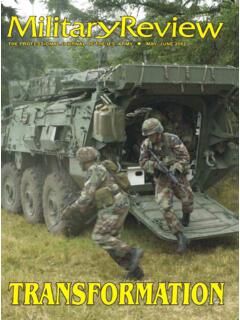Transcription of Followership - Army University Press
1 NCO Journal1 May 2018 FollowershipAvoid being a toxic subordinateBy Command Sgt. Maj. Brian M. DisqueAsymmetric Warfare GroupEverybody has a boss. This is true for the Army; every Army leader, regardless of rank or echelon, is also a follower. The Army spends a lot of time discussing ways to develop leadership, but very rarely do we focus on how to be a good subordinate, though there are different sets of skills to be successful at both. You cannot be a great inspirational leader unless you are a great follower, but nowhere in our doctrine is there a publication with good advice on how to be a great think the best (and only), advice given to me on Followership is, Be in the right place, at the right time (10 minutes early), in the right uniform, with the right attitude, and everything will be ok.
2 The Army has a leader requirements model to tell me what I should be, know, and do as a leader, but lacks sufficient guidance on what and how a good follower should similarly think, act, and Leaders and Bad FollowersSearch the internet for the term toxic leader, and you find a host of definitions and articles. They typ-ically involve an abusive personal attribute, a mis-placed sense of entitlement, or a lack of competence A toxic subordinate is someone who exhibits mannerisms detrimental to a positive command climate, readiness, esprit de corps, and Army values, and who influences others to follow their errant lead.
3 - Command Sgt. Maj. Brian M. Disque (Graphic Composite by Chago Zapata, NCO journal . Photo by Kristian Ogden, Army)NCO Journal2 May 2018 NCO journal provides a forum and publishing opportunity for NCOs, by NCOs, for the open exchange of ideas and information in support of training, education and the ability to build a positive command climate. There is no doubt that many Army leaders meet the above definition, and as a result, their organi-zations subordinate is not part of the Army lexicon but ought to have an equal place when discussing leadership and organizational value because, as stated previously, every leader is a follower.
4 My definition of a toxic subor-dinate is someone who exhibits mannerisms detrimen-tal to a positive command climate, readiness, esprit de corps, and Army values, and who influences others to follow their errant lead. Simply put, they lack a forthright attitude, which is a cancer that can infect the entire crew. The result is similar to toxic leadership: a poor climate and reduced unit do you become a toxic subordinate? 1. Engagement in illegal, immoral, or unethical , there are people in the Army involved in activities which fall into the above category.
5 They are devastating to our readiness, to preserving the trust of the American public, and in creating a good command climate. If Soldiers do something illegal, immoral, or un-ethical, they will be caught and held accountable. If you know someone who is doing wrong and you do nothing, you are as toxic as the person committing the not underestimate how hard this is. I can look at several examples throughout my career where I know I failed the Army because I lacked the courage to police our ranks. I love the Army, and I knew what the right thing was, but I just did not do it.
6 One learns from mis-takes and takes care of Failure to join the team you are have all met the back at Bragg guy who tells you how horrible the current unit is and how their old unit was so much better, while they do very little to imple-ment meaningful change. You will serve in many Army units; some will be better than others. If you are squared away, start making a difference and make your current unit the best it can be. Join the team you are on and make it a great , complaints will not go unnoticed by sub-ordinates, who will wonder if something is wrong.
7 This has a toxic effect on the command climate and will never result in a state of pride in the unit, which is the hallmark of great Social media is the preferred forum to let the world know how bad the chain of command or unit of us have seen the person who likes to film their rant of the day or post about how horrible their leaders are and post it on Facebook. My advice? Busi-ness is business, keep it that way. There have been many decisions I did not like or thought would lead to failure. I did what I could to influence the decisions and went out and did my are, however, open-door policies and oth-er channels which can be used to address Soldiers' concerns.
8 There is no need to suffer in silence but do not use social media to post the unit s business for all the world to see, along with your expert commentary. While you are at it, if you post items inconsistent with Army policies or values, you are well on your way to being a toxic subordinate and face Allowing disagreement to lead to hear it in every after action review: Disagree-ment is not disloyalty. There will be times where you disagree with a decision or course of action your boss makes. Just remember there will also be times when your subordinates will disagree with your decisions.
9 How you execute the decisions with which you disagree will teach your subordinates how to execute the deci-sions with which they do not are doing it right if your subordinates can never tell whether you like a decision because you are completely professional. This is harder than it sounds because often these decisions are very personal. Don t take things personally. Remember your obligation as both a subordinate and leader and execute with the same vigor you would if the idea had been your own. When you allow others to sense your disappointment or lack of confidence in a decision, or fail to support a plan fully, you are a toxic on how to be a great subordinate1.
10 Do not make your problem your boss problem .. BUT .. do not be afraid to ask for help .. AND .. do not manage a mission or project to sentence is full of contradictions and illustrates the difficulty of the art of being a good follower. As a good follower, you should never go to your boss with a problem without attempting to manage it at your level or through other channels. Often, someone in the orga-nization can help you find a solution. When you brief your boss and she says, Did you talk to Capt. Smith?
















